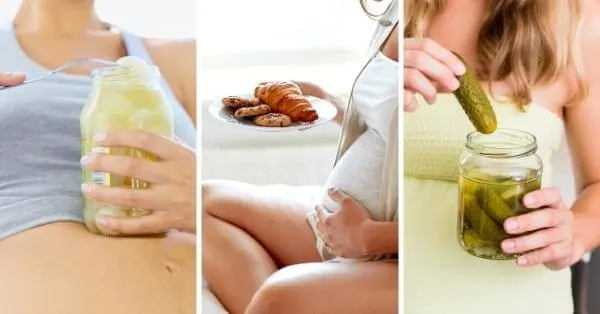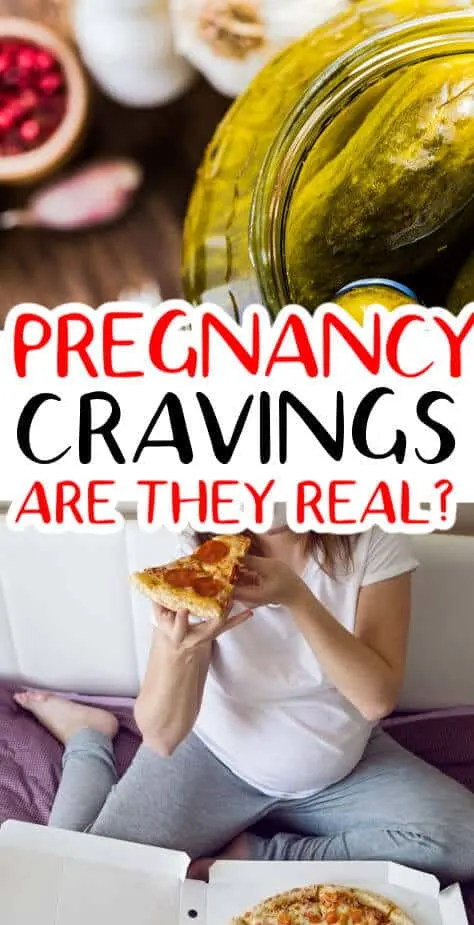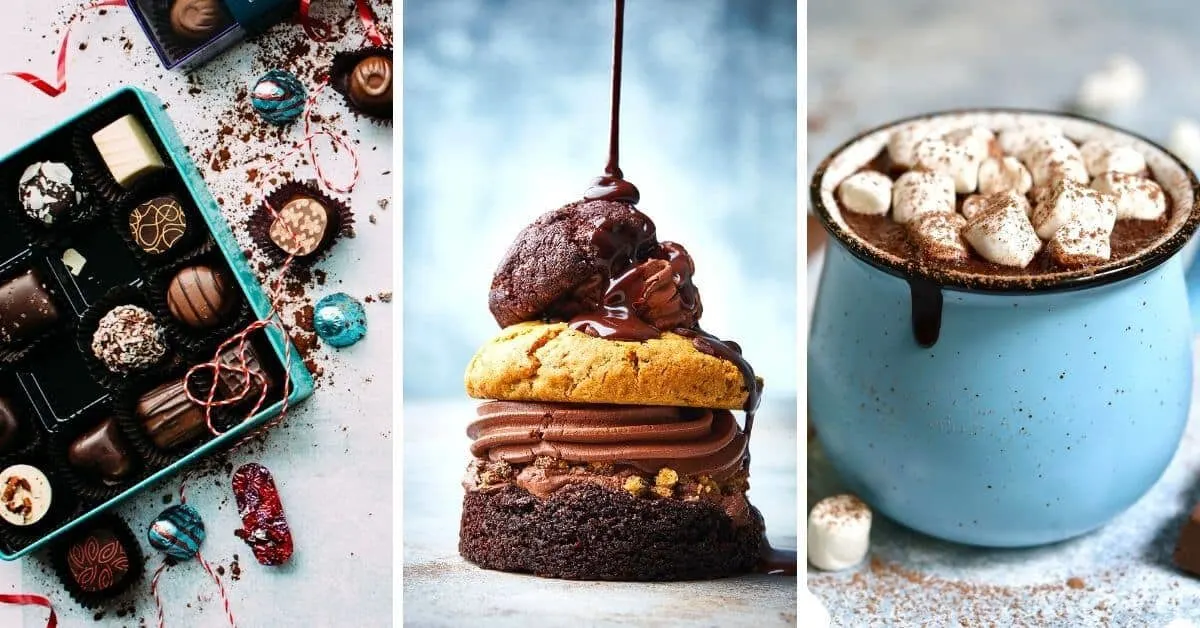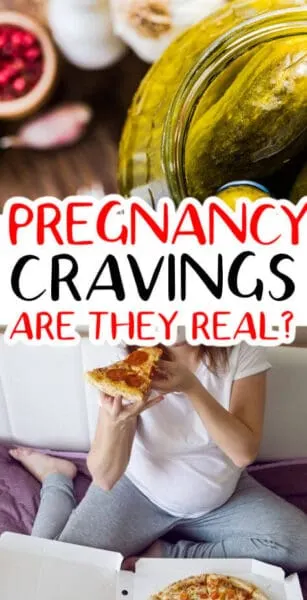Updated May 8, 2023
Are pregnancy cravings real?” this is a question that doctors and midwives get asked frequently during prenatal visits.
If you are pregnant or if your partner is pregnant you may be wondering the same thing.
According to Our OB/GYN Dr. Doug Penta, MD pregnancy cravings are real and not unusual.
He’s here to spill the beans on everything pregnancy cravings.

During my first trimester of pregnancy, I craved two things milk and fish.
I could only keep down pancakes, but all I wanted was milk and fish.
That’s a weird early pregnancy craving!
But was it real?
Let’s find out!

Are Pregnancy Cravings Real?
Yes, pregnancy cravings are real and quite common.
Most women do experience food cravings during pregnancy.
Cravings can begin before one is aware they are pregnant, but most commonly occur towards the end of the first trimester of pregnancy.
Food cravings are often not related to hunger.
Many pregnant women describe cravings as being directed towards specific foods and being accompanied by a sense of urgency. (Source)
Since cravings during pregnancy can be odd, many pregnant women hesitate to discuss their cravings with their friends or doctor.
It is our hope that by the end of this article, you will be convinced that the answer to the question: Are pregnancy cravings real? is a definite YES!
What are the most common pregnancy food cravings?
Some of the more common food cravings are the following:
- Meat
- Cheese
- Pickles,
- Peanut Butter
- Lemons
- Spicy Food
- Chocolate
- Ice Cream
- Pizza

Can I have cravings in early pregnancy?
Yes, you can have cravings early in pregnancy.
Food cravings during pregnancy can start as early as 5 weeks and tend to be most intense during the second trimester.
The cause of food cravings during pregnancy is thought to be the result of a few contributing factors:
- Hormonal: Since cravings can begin as early as 3 weeks it is not surprising that hormonal changes likely contribute to food cravings during pregnancy.
- Nutritional Deficiency: During pregnancy, there are significant nutritional demands. It makes sense that the body will develop food cravings to restore needed nutrients.
- Increased Sense of Smell and Taste: Eating is significantly affected by our sense of smell and taste. Since these senses are enhanced during pregnancy this is very likely to increase food cravings. This is likely an evolutionary adaptation when the senses were essential to search for food during pregnancy.
- Cultural Cravings: From the day we are born we become familiar with the smell and taste of foods associated with our culture.
Safe but strange food cravings during pregnancy
Who hasn’t heard of the “Pickles and Ice Cream” pregnancy craving?
This craving is not concerning because consuming too much is not complicating other medical conditions such as gestational diabetes.
For the most part, strange food cravings during pregnancy are fine as long as they have some nutritional value.
The strange food cravings we will be discussing that might be concerning are related to non-food items that can potentially introduce toxins into your body.
Yes, this might seem odd but once we discuss this condition known as PICA it won’t seem so odd and might be something you can relate to.
If you have strange food cravings, you will want to evaluate these cravings using the guidelines listed below:
- Does the food you are craving have nutritional value?
- Is the food among the list of foods that should be avoided during pregnancy?
- Are you consuming too much of this food, even if it is nutritional?
- Could the food you are craving complicate a medical condition such as gestational diabetes?
Strange non-food cravings during pregnancy
This is the class of “cravings” many may have been waiting to read about because they are bizarre and can be hazardous to your pregnancy.
PICA is the term applied to this unusual condition.
It is not only seen in pregnant women but also among young children.
Though strange, non-food cravings during pregnancy are relatively common, most prenatal care providers who manage large medical practices are very familiar with the condition and will not be surprised if you share your concerns with them.
During my 20 years in clinical practice, the most common Pica craving I observed was ice chewing.
More specifically, chewing on ice chipped out of the refrigerator freezer.
Compared to some of the items I have encountered, this was never surprising or concerning.
On a lighter note, this condition may be less common now that most freezers are self-defrosting.
Some common non-food pregnancy cravings:
- Ice
- Burnt matches
- Plaster
- Rock
- Ashes
- Coffee grounds
When to talk to your doctor or midwife about your cravings:
- If you are getting cravings for non-food items, discuss this with your prenatal care provider. It is common and it is very likely your strange craving during pregnancy is nothing new.
- Strange non-food cravings during pregnancy become a concern if you have or are considering ingesting them strange non-food cravings can be hazardous to you and your pregnancy.
- We might assume that no one would consume weird pregnancy cravings, especially when pregnant. Please don’t assume this as I have seen the strangest things eaten during pregnancy during my 20 years of managing prenatal patients.
What are the foods you shouldn’t eat during pregnancy (even if you crave them):
Not all foods are safe during pregnancy.
These are foods you should not eat even if you crave them:
- Foods that are not pasteurized- Brie, Blue Cheese, etc.
- Certain types of fish- shark, swordfish, anything high in mercury
- Raw eggs
- Undercooked meats- lunch meats.
- Hot foods that are not “hot”, avoid hot foods that have been sitting out without a warming source. Same for foods that should be eaten cold. If there is no ice or refrigeration source keeping the food cool, take a pass.
- Caffeine- soda, chocolate. (Limit your caffeine to less than 200 mg a day)
- Herbal Teas (There are so many ingredients in herbal teas so it is best to simply avoid them.)
Salmonella, E Coli, and Listeria are often found in unpasteurized foods, raw, and undercooked foods. If you can’t be sure these foods have been pasteurized or cooked to the appropriate temperature it is better to pass on them.
Salmonella can cause nausea, vomiting, diarrhea, and fever. These symptoms can lead to dehydration. During pregnancy, dehydration can cause uterine contractions.
E. Coli causes nausea, vomiting, watery or bloody diarrhea, and abdominal cramping. During pregnancy, dehydration can cause uterine contractions.
Listeria in addition to flu symptoms, fever, and muscle aches. Pregnant women can also develop a severe uterine infection referred to as chorioamnionitis (inflammation of the membranes surrounding the fetus).
If you are questioning whether a particular food you are craving is safe during pregnancy, ask your healthcare provider.
Is it safe to ignore food cravings during pregnancy?
It is safe to ignore your food cravings during pregnancy.
It may even be necessary if you have or are at risk of gestational diabetes.
Pregnancy cravings for unhealthy foods can cause additional weight gain above the amount your doctor or midwife has recommended for you.
You can indulge your cravings on occasion and you should.
During my second trimester, I craved Italian food, stuffed shells to be exact.
In order to satisfy my craving and keep it healthier, I added spinach to the ricotta cheese until it was more spinach than ricotta. Spinach is a pregnancy superfood.
If you are craving unhealthy food, try to add a healthier addition to it. Balance carbs with proteins.
Here are some healthy snack options you can eat during pregnancy:
- Whole-grain crackers with nut butter or peanut butter
- Whole-grain cereal
- Bagel and cream cheese
- Pretzels with nut butter or cheese
- Hummus and carrot sticks
- Granola bars
- Apple chips
- Whole apple
- Smashed Chickpea Salad Sandwich
- Chicken Salad Sandwich
- Homemade Dried Fruit
If you have gestational diabetes, some of these foods may not be healthy for you or your baby, so consult your doctor or nutritionist.
I developed gestational diabetes in my third trimester. It sucked. No doubt about it. But the good news is your pregnancy cravings usually start to decrease as you get further into your third trimester.
My pregnancy food cravings decreased quite a bit by 34 weeks.
I didn’t have any non-food cravings.
If you do have cravings for non-food items, you should ignore those cravings. They could be harmful to you or your baby.
Are pregnancy cravings real or an excuse?
Pregnancy cravings are real, and there is a scientific explanation for why they occur.
Hormonal changes in your body can cause you to crave certain foods that you wouldn’t normally eat.
Your body may be trying to tell you it needs something, like more protein or iron.
Are pregnancy cravings what the baby wants?
No. Pregnancy cravings are a result of hormonal changes in your body and not what the baby wants.
Your body’s cravings really just reflect what you need in order to stay healthy and nourished during pregnancy.
If you have strange or non-food cravings, it’s important to talk to your doctor or midwife before acting on them, as some substances could be harmful to you or your baby.
It’s also important to remember that giving into pregnancy cravings doesn’t mean giving up healthy eating habits – it just means being mindful of what your body needs and listening to its cues.
The bottom line on pregnancy cravings:
Yes, pregnancy cravings are real and quite common.
Most women do experience food cravings during pregnancy.
Cravings can begin before one is aware they are pregnant, but most commonly occur towards the end of the first trimester of pregnancy.
They usually are the strongest during the second trimester.
It is OK to enjoy the foods you are craving in moderation.
If it is a super carby food like pizza or pasta try to balance them with more protein or a big green leafy salad.
Craving non-foods during pregnancy isn’t unusual but talk to your doctor or midwife in case it could be a sign of something more serious.
If you are having food cravings that you don’t want to give in to try to distract yourself with another activity.
Taking a walk is not only great exercise during pregnancy it can help you to move on from your pregnancy food cravings.



